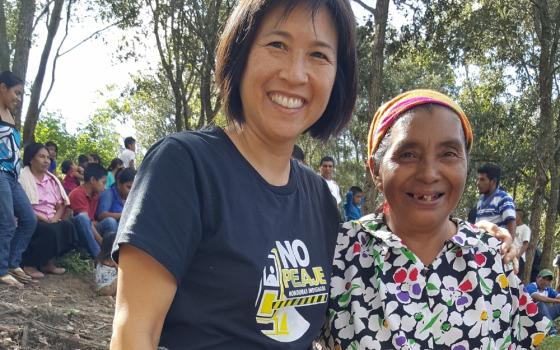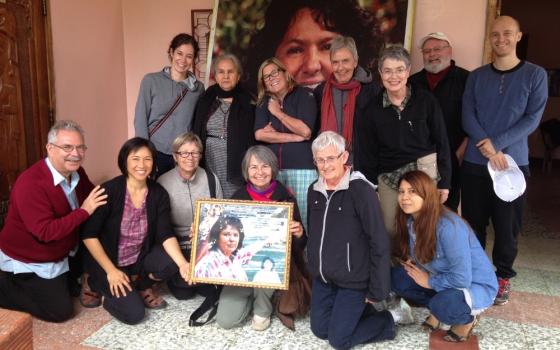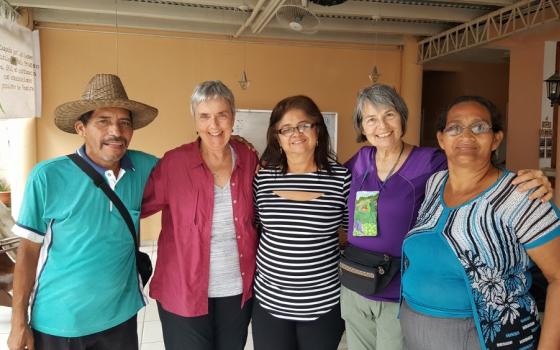I was privileged to join a 10-day "root causes pilgrimage" to Honduras last December with a group from California, the Interfaith Movement for Human Integrity. The purpose of the pilgrimage was to identify the real reasons why so many from the "Northern Triangle" — Guatemala, El Salvador, and particularly Honduras — continue to migrate north despite the many obstacles they face. Delegations like this from the United States provide a witness to the poverty, the political system, and other issues which the people face.
Our trip was led by two very knowledgeable guides. Rev. Deborah Lee, immigration program director, works with faith communities to engage, accompany and advocate for the fair treatment and dignity of immigrants in the San Francisco Bay area. José Artiga is Director of SHARE El Salvador, a foundation that strengthens solidarity among the Salvadoran people in their struggle for economic stability, and partners with Salvadoran Americans. It fosters leadership development, particularly for women and girls, and sponsors delegations such as the LCWR group that visited in 2015 to celebrate the anniversary of the four churchwomen.
Honduras is a country wealthy in resources, but its government fails to develop them for its people, preferring instead to sell its national resources to the highest bidder. Small landowners, small businesses and the indigenous population of the country have fought a continued battle for their land and resources against wealthy corporations, foreign investors and the government. This has led to continued assassination of leaders who have fought for human rights for their people.
Honduras is designated as a high crime area for gangs in one of the most dangerous countries of Latin America. We were told that the gangs are often foot soldiers of the drug lords. Business owners are expected to pay for protection. The violence is a major cause of migration.
To make matters worse, the nation's military is employed to defend large landowners instead of ordinary citizens. The assassination of human rights leaders continues with impunity because, despite international pressure, the government fails to provide protection for these leaders when it is requested.
The assassination of Berta Caceres on March 2, 2016, is a case in point. She was an internationally known indigenous rights leader protecting her people's land against the Agua Zarca Dam, a joint project of a Honduran company and a Chinese company that is the world's largest dam developer. They plan to build a hydroelectric dam on the Gualcarque River, a river sacred to the indigenous people and the source of their livelihood. Other people have been killed because they stood against corporations' taking their land. Migration north is the only route for persons who must leave the country because of threats against their lives and their families.
The U.S. government is complicit in providing military training for the Honduran government, which in turn uses its forces to "protect" the corporations against the people. The Alliance for Prosperity negotiated by then-Secretary of State John Kerry with the Northern Triangle countries in 2014 was intended to discourage migration by encouraging economic development. But it has allowed multinational corporations to set up "model cities," which are really walled industrial complexes where companies can establish free trade zones. They have their own security forces, and within the areas, no national human rights laws apply.
We met with union workers from a T-shirt factory who spoke about the long work hours, from 7 a.m. to 6:20 p.m. Production quotas increase and workers are forced to do in a four-day week what would be a quota for a five-day week. Workers cannot support their families on the minimal wages, averaging only $300 a month. The work is repetitive, often resulting in health issues and injuries. Workers don't receive health benefits and can be fired after being injured. These factors provide more reasons for migration.
We were present for the return of one of the two planes per day arriving from the U.S. in San Pedro Sula, where approximately 300 people per day are returned after deportation. They are handed the only belongings they had with them when they were picked up. Volunteers help to get bus tickets for people to return to their homes. What happens after that is unknown!
It is important to emphasize that our U.S. foreign policies contribute both to the problem of why people are forced to flee and to the reasons people are forced to return. It is our U.S. funding that is used primarily for security, which pays the military but does not provide protection for Honduran citizens who are at risk.
In 2016, the Berta Caceres Human Rights in Honduras Act, HR 5474, was introduced in Congress and signed by 51 legislators, but was not acted upon. This bill would have prohibited funding for police and military in Honduras. It directed the Department of the Treasury to vote against multilateral loans to Honduras for police and military until the U.S. State Department certified that the rule of law was established, and that the judicial system enforced penalties against those in the police and military who committed human rights abuses. This legislation will have to be reintroduced in the new Congress.
To date, the persons who have been charged in the murder of Berta Caceres have not yet been brought to trial. And Berta's case is only one example. We visited farmers in Bajo Aguan whose leaders have continued to be assassinated, two only recently before our arrival. In Rio Blanco, a senior woman in the Lenca tribe, a member of the Council of Elders, said, "We are willing to die so our children may have a future." As we see similar issues in the United States regarding indigenous communities and land rights, it is up to us to stand for "justice for all," the words in our own pledge of allegiance!
Our group met with Señora Berta Flores Lopez, Berta's mother. She spoke about Berta's visit with Pope Francis, when she brought leaders of COPINH (the Civil Council of Popular and Indigenous Organizations of Honduras) to present a list of demands of the indigenous people to ask for support of their land rights. Lopez emphasized the need for faith communities to continue to support the indigenous people in these efforts.
Throughout the course of our trip, we heard several times from different groups that the presence of faith groups is important because we are witnesses to the abuse which the people have suffered. The government does not want international incidents involving harm to foreign groups.
Each of us who asked to participate in this pilgrimage agreed to write and speak to others when we returned home. It is a story that each of us must tell in our own words. I listen to the anti-immigrant rhetoric that has been in the news so often these days, and know I must tell this story because these people are caught in a vise. They love their families; they love their country; but they can't live with continued violence and poverty. They come north to survive. Until our government is willing to withhold funding until human rights abuses are corrected and to insist that money given for economic development be used for the development of small businesses and economic opportunities for young people, nothing will change.
To read the blog about our entire experience written by members of the group, please visit rootcausesdelegation.wordpress.com. Much of the information about Latin America was from The Council on Hemispheric Affairs (COHA), a non-profit independent research and information organization.
[Phyllis Tierney is a member of the Sisters of St. Joseph of Rochester and coordinator of the Sisters of St. Joseph Justice and Peace Ministry, which is focused on immigration, human trafficking and environmental concerns like water and climate change. She edits Just Us.]



